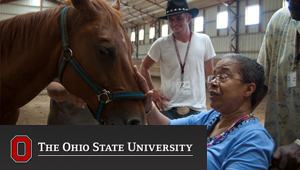Ohio State Study Suggests Horses Can Help Dementia Patients
By Nora Al Baghdadi
In a May 2014 article posted by The Ohio State University, the school states that caring for horses can have beneficial effects on patients suffering from dementia. In what the University calls the first study of its kind, the report shows that patients who spent time with, and cared for the horses were calmer and happier following their time with them.
Equine therapy has been known to get results in children and teenagers who display emotional or developmental disorders. This is the first indication it may have similar results on older patients with dementia. Some nursing homes have long encouraged animal therapy using small animals like dogs and cats. This study shows the potentially benefits of using larger animals.
The study was a combination of efforts of OSU, an adult daycare center and an equine therapy center. The study showed that with the help of staff, patients could groom and walk the horses, and do so safely with positive attitudinal results.
The adult daycare center involved recruited 16 volunteer Alzheimer patients who would normally spend the day working on crafts or other routine activities in the management of their disease. Once a week, eight would travel to an equine education center while the other eight would stay at the adult daycare center. Then the groups would switch. This occurred over a period of a month so each group had a total of four trips to work with the horses. The patients were supervised and observed by the daycare center workers and Ohio State College of Social Work students and staff as well as students and staff of the College of Veterinary Medicine at Ohio State. When at the equine center, patients performed routine equine care duties like grooming, walking, bathing, and feeding.
To track the study, researchers used what is called the Modified Nursing Home Behavior Problem Scale. With it, staff monitors the behavior of patients and scores it on the scale. On the four point scale where zero means patients never exhibit negative behavior and four points means they always exhibit a negative behavior, patients who went on the trip score an average of one point better.
Researchers also measured the stress hormone cortisol. Through swabbing the mouths of participating patients, they tested the amount of the hormone in the patient’s saliva. Patients who exhibited less severe symptoms of dementia showed a rise in cortisol, a result researchers interpreted as a rise in what they called “good stress”.
Many patients, with physical limitations due to age and the disease itself seemed to push through those limitations when in the presence of the horses. The relative of one patient said that when asked about activities during a routine day, the relative’s loved one could rarely recall details. When asked about the visits to farm, details were provided in sometimes vivid details.
The privately funded study has led to some of the families continuing the visits to the equine center for their loved ones. The results of the study could, in some cases, lead to horses being brought to some dementia care facilities where the environment allows. It may also lead to more road trips for seniors to equine care facilities.
Now, along with the presence of small animal therapy involving cats, dogs, birds and even fish tanks, this form of therapy would appear advancing to larger animals.
The results of the study and further details are available on the official Ohio State University newsroom website. The Ohio State University main campus is located in Columbus, Ohio. The University also has five regional campuses throughout the state.
Search
News

رئيس جامعة الناصر الاستاذ الدكتور عبدالله حسين طاهش يقوم بزيارة تفقدية للجان والقاعات الامتحانية الخاصة بكلية الهندسة وعلوم الحاسوب الاثنين 24 فبراير 2025
قام رئيس الجامعة الاستاذ الدكتور عبدالله حسين ط...
جامعة الناصر تنظم ورشة حول التهيئة الرمضانية لمنتسبيها
نظمت جامعة الناصر صباح اليوم الأثنين 25 شعبان 1...
اختتام المؤتمر العلمي الأول للجامعات اليمنية في صنعاء
اختتم اليوم في العاصمة صنعاء، أعمال المؤتمر الع...
لليوم الثاني على التوالي، استمرار أعمال ونقاشات المؤتمر العلمي الأول للجامعات اليمنية.
تستمر في العاصمة صنعاء لليوم الثاني على التوالي...
بمشاركة جامعة الناصر وبحضور رسمي رفيع انطلاق المؤتمر العلمي الأول في صنعاء
صنعاء 20 شعبان 1446 هجرية الموافق 18 فبراير 202...

